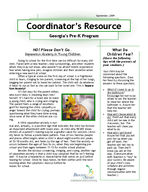September, 2009
Coordinator's Resource
Georgia's Pre-K Program
NO! Please Don't Go...
Separation Anxiety in Young Children
Going to school for the first time can be difficult for many children. Faced with a new teacher, new surroundings, and other students whom they may not know, who wouldn't be afraid? Adults experience fear when taking new jobs; imagine children and their anxieties when entering a new world at school.
Often a typical scene on the first day of school is a frightened child in tears, clinging to her parent, screaming at the top of her lungs, begging her parent not to leave her behind. The child will do whatever it takes to run as fast as she can back to her loved one. This is Separation Anxiety!
It's not easy for the parent either, who most likely is shedding tears him/ herself. It's hard for a loved one to leave a young child, who is crying and clinging. The parent feels a range of emotions: guilt for leaving the child; sympathy or anger toward the child for crying; perhaps questioning what they have done wrong since none of the other children are crying.
A little separation anxiety is normal and, actually, is a positive sign that indicates the child has formed an important attachment with loved ones. (A child who NEVER shows distress at a parent's leaving may be a greater cause for concern.) Anxiety tends to follow a predictable pattern. Fear of less familiar people and places often begins when a child is about eight months old, peaks at 10-18 months old, and fades by the age of two. Then the anxiety reoccurs between the ages of four to six, when they are beginning preschool and then again between 11-13 for middle school phobias.
Besides the obvious screaming, clinging, and crying, another sign of separation anxiety is that a child may complain that he isn't feeling well. It may be a headache or stomachache that comes on just before leaving for school. Once he stays home, he feels better until the next morning when the symptoms reoccur before he leaves for school.
What Do Children Fear?
(Share the following tips with the parents of your students.)
Your child may be
concerned about the
following questions. Ease
her fears by discussing the
answers to these questions.
Introduction
2
What if I need to go to
the bathroom?
Encourage her not to be afInrasiidde Sttooray sk the teach2er
to show her where the
bathroom is. Assure her
that the teacher will
heInlspideheStro.ry
2
How will I know what to
do? Point out that every
child will be new in the clIanssisdreoSotomry, too. The 3
teacher will show you
what to do.
How will I get home? AsInssuidreeShtoeryr that you w4ill
pick her up when you
get off work. Her
teacher will tell her to paIncsikdeuSpt.orTy hen she'll 5
know you are on the
way. (Communication
with teachers is "key" to yoInusridesuStcocrey ss. Be awar6e
of your child's class
schedule and activities
through regular
communication with the
teacher.)
Bright from the Start
10 Park Place South SE, Suite 200 Atlanta, GA 30303
Phone: 478-550-0974 E-mail: lori.smith@decal.ga.gov
Make sure you use the free resources
available in your community!
Inform parents of these free programs:
"Tools for Schools" program at Ingles "Upromise" program at Publix and Kroger
Kindergarten Transition
Reading Under the Stars
On August 25th, First Lady Mary Perdue hosted "Reading Under the Stars" at the Georgia Governor's Mansion. Mrs. Perdue read Bedtime in the Jungle by John Butler in the mansion gardens. The Pre-K student pictured below with the First Lady made a puppet, ate ice cream, had her face painted, and played on the Governor's playground.
Even though the school year has just started, it is already time to start working on Kindergarten transition. The first step is to determine where each child will attend Kindergarten. Even children in a public school Pre-K may not attend Kindergarten at the same school. The school system transportation department can provide attendance zone information.
Helping Children by Strengthening
Families
E-mail me your ideas about parent
involvement, parent workshops, pictures
of activities, and news in your area to
be included in the newsletter.
Helping Families Prepare for an Emergency
Georgia has a new website that helps families create an emergency plan for weather, fire, national emergencies, etc. This website provides information on what supplies and information may be needed in time of an emergency.
www.ready.ga.gov/user/
Gilmer County Pre-K Involves the Community in Keeping Children
Safe and Healthy
Gilmer County Pre-K hosted a Georgia Child Identification Program (GA CHIP) in August. Many families participated in the free event. A dental hygienist made a dental impression of and collected DNA samples from each child. Other relevant identifying information on each child was gathered at other stations. Each child's information was recorded on a CD which was placed in an envelope with the sealed dental impression and sent home with the family. The CD is compatible with the Amber Alert System.
